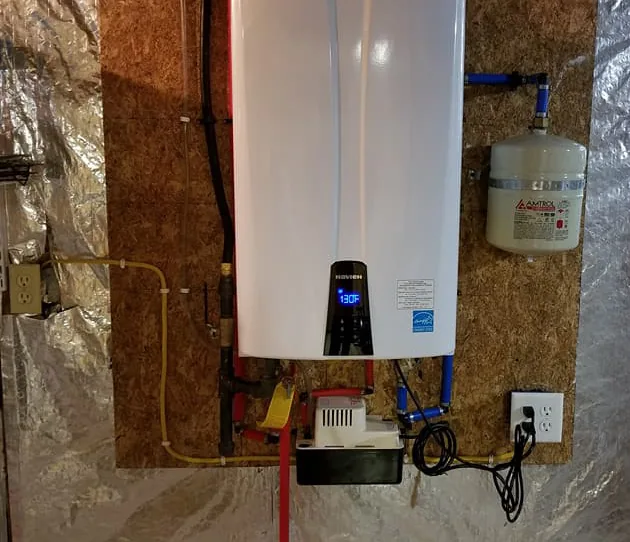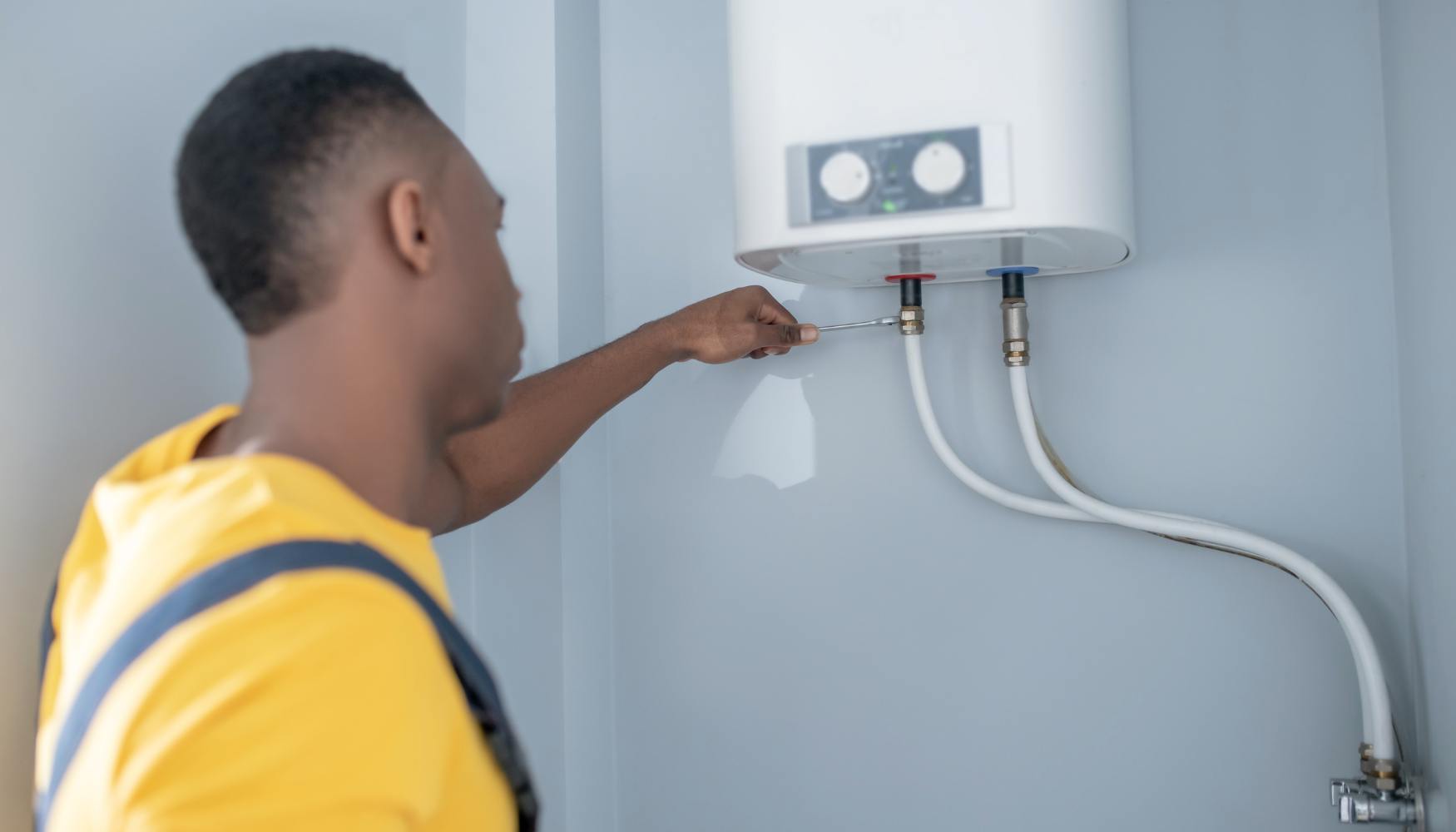Obtaining More Value: The Advantages Of Smart Water Heaters
Obtaining More Value: The Advantages Of Smart Water Heaters
Blog Article
Each person will have their own ideas with regards to Six Benefits of a Tankless Hot Water Heater.

In a world where convenience and effectiveness preponderate, it's no surprise that home owners are continuously looking for smarter ways to manage their home's power consumption and convenience. One innovation that has actually continuously acquired popularity is the tankless water heater. However just what makes these systems stand apart from the conventional tank-based versions the majority of us grew up with? Allow's dive in and explore the benefits of tankless hot water heater, assisting you make a decision if it's time to make the switch in your house.
Introduction
Picture this: you enter the shower after a long day, expecting a soothing cascade of warm water, just to be welcomed by icy droplets since the last person used all of it up. Sound familiar? Typical hot water heater save a fixed quantity of hot water, suggesting you go to the grace of that tank's supply. Tankless systems, on the other hand, warm water on demand. Say goodbye to going out mid-shower, say goodbye to fumbling with routines simply to guarantee warm water is available.
Comprehending Tankless Hot Water Heater
What Are Tankless Hot Water Heater?
Tankless water heaters, sometimes referred to as on-demand or immediate water heaters, provide warm water just as it's required. Instead of saving gallons of pre-heated water, these units kick right into activity the moment you turn on the faucet. Water passes through a heat exchanger, warming up in real-time, implying you get a continuous circulation of hot water without the need for a large storage tank resting lazily by.
Just how Do They Differ from Typical Solutions?
Conventional heating units hold a storage tank of hot water, using energy to keep that storage tank at a consistent temperature level. Tankless systems get rid of the standing supply, reducing thrown away power and the bulky footprint of a huge cylinder. Essentially, you're updating from a "stockpile" way of thinking to a "made-to-order" method.
Usual Types of Tankless Devices
Tankless water heaters generally can be found in 2 varieties: gas and electrical. Gas models have a tendency to deliver higher circulation prices, suitable for bigger homes, while electrical versions usually offer smaller sized homes and are usually less complicated to mount. Furthermore, some systems are made for point-of-use (serving one component) while others can take care of the whole home's warm water demands.
Key Advantages of Tankless Hot Water Heater
Power Efficiency and Price Financial Savings
No more heating up a giant container's well worth of water and maintaining it cozy all the time. Tankless heaters minimize standby power losses, which can reduce energy bills. While the initial cost could be higher, the long-term cost savings frequently warrant the investment.
3. Space-Saving Style
If your home is short on storage, eliminating the large storage tank frees up valuable area. Tankless systems are compact and can typically be mounted on wall surfaces, hidden in corners, or mounted in tight utility wardrobes without hogging the entire room.
4. Longer Lifespan
A well-maintained tankless hot water heater can outlive its tank-based cousin. Conventional containers may last 10-15 years, while tankless models can keep downing along for two decades or even more, making them a solid financial investment over time.
1. Unlimited Hot Water Supply
Ever needed to arrange showers so everybody obtains their reasonable share of hot water? With tankless, that comes to be a distant memory. As long as the heating system's circulation ability isn't surpassed, you can take back-to-back showers without turning into a popsicle.
5. Improved Water High Quality
Storing water in a storage tank can occasionally result in sediment accumulation or a somewhat "off" taste. With tankless systems, fresh water is heated up on the spot, minimizing the chances of sediment accumulation and potentially providing cleaner-tasting water.
Considerations Prior To Changing
Though the benefits are compelling, it's a good idea to think about a couple of aspects prior to completely committing.
Assessing Your Home's Water Usage Patterns
If your family all at once makes use of several fixtures with high warm water need, ensure the unit's circulation rate satisfies your requirements. Knowing your use patterns helps you select the ideal size and kind of tankless heater.
Maintenance and Care Tips
Tankless systems are reasonably reduced upkeep, however they aren't set-it-and-forget-it devices.
Routine Cleaning and Descaling
Tough water minerals can build up in the heat exchanger, affecting efficiency. Routine descaling (frequently advised annually) maintains the unit going for peak performance.
Annual Expert Examinations
A yearly checkup from a professional makes sure small concerns are captured early. They'll analyze the device's performance, search for leakages, and aid maintain optimum performance.
First Financial Investment Prices
Tankless heating systems typically feature a greater in advance price tag. In between the unit itself and possible setup modifications, the initial expense could give you sticker label shock. Yet bear in mind to view it as a long-lasting investment.
Installment Needs
Relying on your home's framework, you could require extra electric capacity or gas line upgrades. Guarantee you comprehend the installation requirements and seek advice from an expert to avoid surprises.
Making Certain Appropriate Ventilation
For gas designs, correct ventilation is necessary to securely expel exhaust gases. Make certain airing vent systems are clean and properly mounted to prevent any type of prospective safety and security hazards.
Comparing Different Brands and Designs
Not all tankless water heaters are developed equivalent.
Looking Into Reputable Suppliers
Look for reputable brand names with a history of creating quality systems. A trustworthy maker commonly offers far better client support and longer warranties.
Installment: DIY or Expert?
While some homeowners delight in taking on projects themselves, tankless setup could not be the best time to break out the tool kit.
Pros and Cons of Do It Yourself Installation
A DIY set up might save cash, but it features threats. Wrong setup can bring about inadequacy or safety issues. If you're handy and have experience, it might be possible-- but proceed with care.
Reading Reviews and Customer Responses
User testimonials and comments from next-door neighbors or good friends who have actually gone tankless can use useful understandings. In some cases, real-life experiences can be more informing than advertising and marketing pamphlets.
When to Call a Professional Plumbing Professional
For a lot of, calling a professional makes sure everything's done properly. A professional plumbing technician comprehends neighborhood codes, sizing requirements, and venting criteria, decreasing the threat of mishaps.
Making the most of Performance
You've purchased a tankless device-- now maximize its effectiveness.
Optimum Temperature Settings
Most people set their systems in between 120-140 F. Readjusting the temperature level can improve comfort and savings. Experiment to discover a pleasant place that does not lose power.
Pairing with Low-Flow Fixtures
Wish to extend your device's abilities? Think about installing low-flow showerheads and faucets. They minimize water use, enabling your tankless system to provide a constant stream of hot water without stressing.
Ecological Effect
Tankless hot water heater line up with greener living goals.
Lowered Carbon Impact
By using less power and only heating water as required, tankless systems can reduce your home's carbon footprint, lowering your environmental impact.
Saving Natural Resources
Much less energy intake and less thrown away hot water convert into fewer natural deposits being used, an ecological win-win.
Who Benefits Most from Tankless Heating systems?
The beauty of tankless heating units is that they can fit a selection of homes.
Big Family Members vs. Solitary Residents
Big families might love the endless warm water supply, while solitary owners value the power savings from not heating an entire storage tank for just a single person's early morning shower.
Home Owners with Minimal Room
If your home is short on square footage, shedding the cumbersome tank frees up room for various other basics-- or possibly simply much more elbow room.
Eco-Conscious Consumers
Going tankless aligns with eco-friendly worths, ensuring you're not wasting power or resources.
Future Patterns in Tankless Water Heaters
The globe of home devices is ever-evolving, and tankless water heaters are no exception.
Developments in Technology
R&D is continuously enhancing warm exchangers, making systems a lot more efficient and resilient. Future models might be also quieter, a lot more compact, and far better suited for differing environments.
Smart Home Integration
Envision adjusting your water heater's temperature via an application or receiving maintenance informs on your phone. As clever home technology advancements, we'll see even more connection and benefit.
Final thought
Selecting a tankless water heater is greater than just upgrading your home's warm water system; it's buying long-term convenience, energy efficiency, and a greener lifestyle. By considering your household's water usage, being mindful of installment needs, and dedicating to routine maintenance, you can delight in a steady stream of hot water without the baggage of a cumbersome storage tank. As modern technology develops, you can anticipate even smarter, more reliable tankless solutions that not just make your life simpler yet likewise profit the planet.
5 Benefits of Tankless Water Heaters
Save Valuable Space
Since tankless water heaters do not have a massive 40+ gallon tank of water, they are considerably smaller and can fit in more narrow spaces in your home.
If you are working with limited square footage, a tankless water heater will still provide you with the hot water you need while taking up significantly less space in your home. While the exact size of a tankless water heater varies depending on the brand, some are as small as a carry-on suitcase.
Endless Supply of Hot Water
While a traditional water heater preheats and stores your water in the tank, tankless water heaters do not rely on a reservoir system.
This means that they do not run out of hot water like traditional water heaters since they make hot water as needed. Traditional water heaters need to stop and reheat water when the tank inevitably runs out, but tankless water heaters do not have this issue.
Provide Warm Water On-Demand
As mentioned above, tankless water heaters do not preheat a certain amount of water and then store it in a massive tank to be used later. An advantage of installing a tankless water heater includes water being heated instantly whenever you turn on the faucet.
When you turn on the water, it will travel through a heat exchanger in the unit and be heated with either an electric element or a natural gas burner. Gone are the days of having to ration out your hot water to make sure that you do not run out.
Longer Life Cycle
Not only do tankless water heaters provide an endless supply of hot water for your home whenever you want it, but these units tend to have a longer lifespan than water heaters with tanks.
Tanked water heaters have an average lifespan of around 10 years, as the tank is prone to corrosion, leading to serious issues. In comparison, tankless water heaters can last for around 15 to 20 years with the proper maintenance and tune-ups.
Energy Efficient
Compared to traditional water heaters, tankless water heaters are a more energy-efficient water heating option for your home. Tank water heaters must heat and reheat the water stored in the tank throughout the day, even if you are not home.
This energy use adds up over time, leading to an increase in your energy bills and added strain on your unit. A benefit of buying a tankless water heater includes saving money since it only operates when you turn on the hot water. Since it only heats up as needed, this can decrease your energy bills and save you money in the long run.
https://callrandazzo.com/blog/5-benefits-of-tankless-water-heaters/

I am just very excited about and I'm hoping you liked the new piece. I beg you take a moment to promote this blog posting if you liked it. Thanks for going through it.
Call Today Report this page